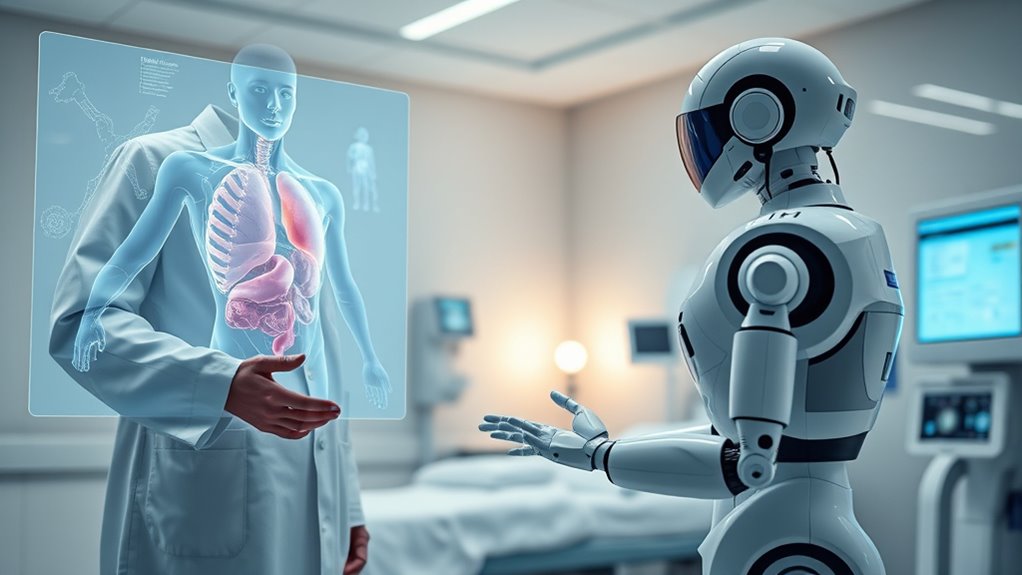AI is transforming healthcare jobs by streamlining workflows, supporting clinical decisions, and enabling personalized care. It automates data analysis from medical records, images, and genetics, helping you diagnose and predict risks more accurately. As AI takes over routine tasks, your focus can shift toward patient interaction and improving care quality. While AI enhances your role, understanding its ethical use and limitations is essential. Keep exploring to see how these changes will affect your future in healthcare.
Key Takeaways
- AI automates data analysis, enabling healthcare professionals to focus more on patient interaction and personalized care.
- Machine learning enhances diagnostic accuracy and predicts patient risks, improving treatment outcomes.
- AI tools support clinical decision-making, increasing efficiency and reducing errors in patient care.
- Ethical oversight and human judgment remain essential to ensure responsible AI use and address biases.
- AI-driven technologies are transforming healthcare roles by augmenting skills and expanding the scope of patient-focused services.

Have you ever wondered how artificial intelligence is transforming healthcare jobs? It’s an exciting evolution, especially as AI tools become more integrated into daily patient care. As healthcare professionals, you’re now charting a landscape where AI enhances decision-making, streamlines workflows, and improves patient outcomes. But with this rapid change comes a need to consider AI ethics — ensuring that these advancements are used responsibly and fairly. When deploying AI, you must be aware of potential biases in data and algorithms that could affect patient treatment. For example, if machine learning algorithms are trained on skewed datasets, they might produce inaccurate diagnoses or recommendations for certain populations, risking disparities in care. That’s why AI ethics is essential: it guides you to develop, implement, and oversee AI systems that are transparent, equitable, and respectful of patient rights. As you integrate AI into your practice, understanding these ethical considerations helps you maintain trust and uphold professionalism.
At the core of AI’s impact are machine learning algorithms, which enable systems to learn from vast amounts of data and improve their performance over time. These algorithms analyze medical records, imaging, genetic information, and more to assist in diagnosing diseases, predicting patient risks, and recommending treatments. For you, this means having access to faster, more accurate insights that can inform your clinical decisions. Instead of manually sifting through endless data, machine learning algorithms do much of the heavy lifting, freeing you to focus more on patient interaction and care quality. They can flag early signs of deterioration or suggest personalized treatment plans, reducing the margin for error and enhancing patient safety.
However, it’s essential to recognize that these algorithms are only as good as the data they’re trained on. Biases present in training data can lead to flawed outputs, which underscores the importance of continuously evaluating and refining these tools. As a healthcare professional working alongside AI, you play a key role in ensuring these systems are used ethically and effectively. You need to verify AI-generated suggestions, understand their limitations, and remain the final authority in patient care. This balance between leveraging machine learning algorithms and maintaining human oversight is imperative for ethical AI adoption. In doing so, you’re helping to shape a future where AI in healthcare not only advances technological capabilities but also upholds the core values of medicine—patient safety, fairness, and trust.
Frequently Asked Questions
How Does AI Impact Healthcare Job Security?
AI integration can threaten your healthcare job security through potential job displacement, as automation handles routine tasks. However, it also creates opportunities for you to focus on complex, empathetic patient care, enhancing your skills. Staying adaptable and embracing new AI tools can make you indispensable. Ultimately, AI reshapes roles rather than replacing them, so your ability to evolve determines your job stability amid ongoing AI integration.
What New Skills Are Needed for AI Healthcare Roles?
You need to develop skills in machine learning and data analysis to excel in AI healthcare roles. Understanding how algorithms work helps you interpret patient data more effectively, while strong data analysis skills enable you to identify patterns and improve care. Additionally, cultivating knowledge of healthcare systems and ethical considerations guarantees you can integrate AI tools responsibly, making you a valuable asset in the evolving medical field.
How Is Patient Privacy Protected With AI?
You might worry about privacy, but AI safeguards it through robust data security measures and consent management. While AI processes vast amounts of personal info, encrypted systems protect your data from breaches. Consent management ensures you’re in control, allowing you to decide what info is shared. This balance between innovation and privacy assists in keeping your health data safe, even as AI enhances patient care.
Are AI Tools Accessible for Small Healthcare Providers?
Yes, AI tools are becoming accessible for small healthcare providers. You can find affordable implementation options that fit limited budgets, making it easier to adopt AI technology. Additionally, training accessibility improves with online resources and user-friendly interfaces, so you don’t need extensive technical expertise. This means you can efficiently incorporate AI into your patient care roles, enhancing service quality without significant financial or training barriers.
What Ethical Concerns Arise From AI in Patient Care?
Imagine AI as a double-edged sword—powerful yet risky. You must watch for algorithm bias, which can skew diagnoses, and guarantee informed consent, so patients understand AI’s role. These ethical concerns challenge your trust and fairness in care. If unchecked, AI could inadvertently harm vulnerable patients or erode autonomy. Staying vigilant helps you balance innovation with ethical responsibility, safeguarding patient rights while embracing technological progress.
Conclusion
As AI continues to reshape healthcare, the future of patient care remains uncertain yet thrilling. Will these advancements elevate your role or challenge your expertise? The lines between human and machine are blurring, promising both incredible opportunities and unforeseen obstacles. Stay alert—what’s coming next could redefine how you care for patients forever. The question isn’t just what AI can do, but how you’ll adapt to what’s about to unfold.









